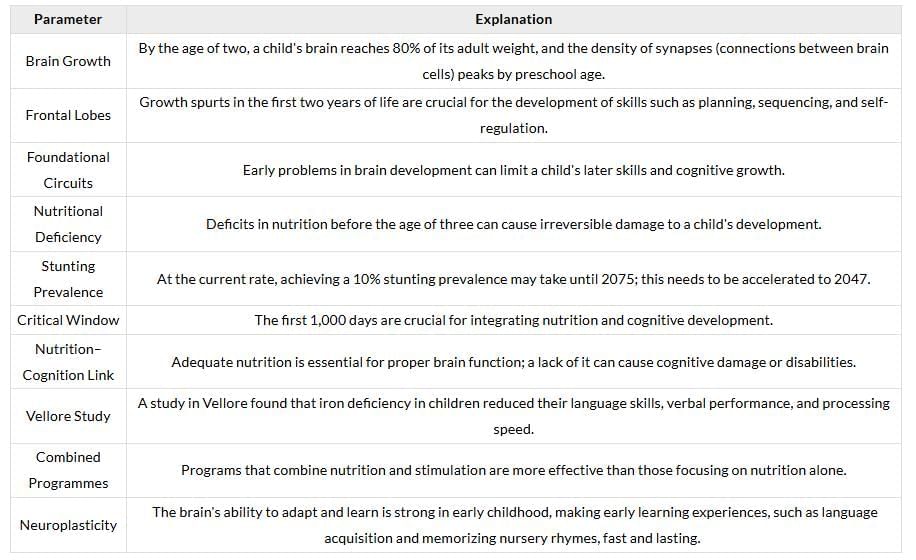The Hindu Editorial Analysis- 25th August 2025 | Current Affairs & Hindu Analysis: Daily, Weekly & Monthly - UPSC PDF Download

Nourish to flourish, the nutrition and cognition link
Why is it Important?
- The first 1,000 days of a child's life are crucial for their brain development and nutrition. Just like catching a flight on time is important, ensuring proper growth during this period is vital for a child's future success.
- If this critical window is missed, the child may not reach their full potential, similar to missing an important flight.
What does the Research Say?

Childcare Initiatives in India
- ICDS Programme:. major childcare scheme globally, focusing on nutrition and education for early childhood development.
- Poshan Bhi Padhai Bhi: An initiative linking nutrition with cognitive development.
- Navchetana Framework: National guidelines for early childhood stimulation from birth to three years.
- Stimulation Activities: 140 age-specific activities for social and cognitive growth over 36 months.
- Caregiver Role: Designed for parents, Anganwadi workers, and crèche staff, especially during home visits.
- Play-Based Learning: Encourages stimulation through play and caregiver interaction, not formal teaching.
- Home Visits: Combine nutrition, timely feeding, and cognitive support for children under three.
- Holistic Development: Reduces risk of developmental delays from nutritional deficits.
Areas for Improvement
- Frontline Workforce: Strengthen 14 lakh Anganwadi centres and workers for child nutrition and stimulation.
- Coverage: Expand ICDS outreach to cover all target populations.
- Quality Services: Focus on high-quality delivery in health, nutrition, and early learning.
- Technology: Utilize digital tools for monitoring, efficiency, and service delivery.
- Urban Expansion: Enhance ICDS presence in underserved urban areas.
- Pre-primary Education: Improve access, capacity, and delivery of early education.
- Evaluation: Regularly assess child health, learning, and psychosocial well-being.
- Workforce Participation: Support women’s entry into the productive workforce.
- Crèche Models: Expand childcare through public, community, and PPP models.
- Human Potential: Early nutrition and stimulation empower children and women.
- Irreversible Loss: Missed opportunities in early years cannot be regained.
Conclusion
Investing in early childhood development is increasingly important in today's fast-changing world of automation, mechanization, and technological progress. As industries evolve, the need for low-skilled and unskilled workers is expected to decline, leading to fewer job opportunities for them. Preparing individuals from a young age with strong cognitive, social, and technical skills will help them adapt to this shifting landscape and secure meaningful livelihoods in the future.
Practising compassion
Why in News?
Chronic underestimation of shelter costs weakens their sustainability.
Introduction
The Supreme Court's changing view on free-roaming dogs shows the difficulty in balancing kindness with public safety. India struggles with a serious rabies problem, inadequate sterilization efforts, and inconsistent policy enforcement. While street dogs are a natural part of urban life, creating safe public areas requires a humane and effective strategy that includes sheltering, vaccination, and legal changes.
Supreme Court's Directions and Course Correction
August 11, 2025 order:
- Directed the Municipal Corporation of Delhi to round up stray dogs and confine them in shelters.
August 22, 2025 modification:
- Allowed the release of dogs after vaccination and deworming, except for aggressive or rabid ones, who would be retained.
Significance:
- The court recognized the inadequacies in the existing Animal Birth Control (ABC) framework, particularly in India's densely populated areas.
Public Health and Safety Concerns
- Rabies burden: India has one of the highest rates of rabies globally, leading to severe health issues, high medical costs, and restrictions on children's activities.
- Disproportionate impact: Poor families, who struggle the most with healthcare access, are the hardest hit by this issue.
- Sterilisation gap: The Animal Birth Control (ABC) Rules, even after their 2023 update, are ineffective without 70% sterilisation coverage, a target no major city has met.
Challenges of Sheltering Stray Dogs
- Objections raised: Concerns include the risk of overcrowding, the potential for disease in shelters, and ecological disruption from permanently impounding dogs.
- Counterpoint: It is feasible to have well-resourced shelters that meet veterinary standards, space requirements, and proper oversight.
- Comparable model: Large-scale cattle shelters are already functioning in India, demonstrating the viability of such facilities.
- Problem source: The issue lies in administrative neglect and fragmented policy implementation across states, not in the concept of shelters for stray dogs.
Social and Cultural Dimensions
- Street dogs in urban fabric: Street dogs provide companionship, particularly to homeless individuals, becoming a part of the urban community.
- Rights of citizens: While cultural compassion is important, it cannot compromise the human right to safe and secure public spaces.
- Ethical handling: Stray dogs should be rehomed or sheltered with compassion, and those that are incurably aggressive or ill should be humanely euthanized to ensure public safety.
Need for Legal and Institutional Reform
- Outdated law: The Prevention of Cruelty to Animals Act, 1960, is no longer suitable for current circumstances and needs revision.
- Proposed statute should:
- Classify stray dogs as adoptable, those suitable for shelters, and those unfit for either.
- Mandate the establishment of municipal shelters that meet minimum standards.
- Ensure transparent and accurate counting of stray dog populations across states.
- Assess the costs of maintaining shelters accurately and realistically.
Supporting Infrastructure and Governance
- Veterinary support: Involving the national veterinary cadre is crucial for consistent and effective implementation of stray dog management policies.
- Waste management: Improving waste management is essential to reduce food sources that sustain and attract street dog populations.
- Accountability: Implementing strict penalties for pet abandonment is necessary to prevent the replenishment of stray populations.
- Long-term risk: Without necessary reforms, India risks replacing visible street dangers with hidden neglect in shelters, creating a different but equally concerning problem.
Conclusion
Achieving a sustainable balance between animal welfare and human rights in India requires:
- Modern legislation that addresses current realities.
- Regulated shelters that meet minimum standards and are effectively managed.
- Efficient waste management practices to reduce food sources for stray dogs.
- Strict actions against pet abandonment to prevent the increase of stray populations.
Compassion for animals must extend beyond the streets into systemic solutions that ensure the safety and well-being of both citizens and canines. Without these reforms, India risks perpetuating cycles of visible danger on the streets and hidden neglect within shelters.
|
38 videos|5269 docs|1114 tests
|
FAQs on The Hindu Editorial Analysis- 25th August 2025 - Current Affairs & Hindu Analysis: Daily, Weekly & Monthly - UPSC
| 1. What is the significance of nutrition in cognitive development? |  |
| 2. How does compassion impact mental health and cognitive function? |  |
| 3. What are the key nutrients linked to improved cognitive performance? |  |
| 4. Can dietary habits affect emotional well-being? |  |
| 5. What role does early childhood nutrition play in long-term cognitive outcomes? |  |





















